If you're looking for the best low profile car jacks, consider the Pro-Lift F-767, which offers a lifting range from 3-3/8 to 14 inches and features a durable design. The VEVOR 3 Ton jack is great for heavy vehicles with a quick lift feature, while the 2 Ton Heavy Duty Steel jack provides excellent portability and safety. For rapid lifting, check out the Dual Pistons model, and don't miss the Floor Jack Kit, which comes with handy accessories. Each of these options guarantees easy access and safe lifting, making vehicle maintenance a breeze. Discover even more options and insights ahead!
Pro-Lift F-767 Grey Low Profile Floor Jack – 2 Ton Capacity
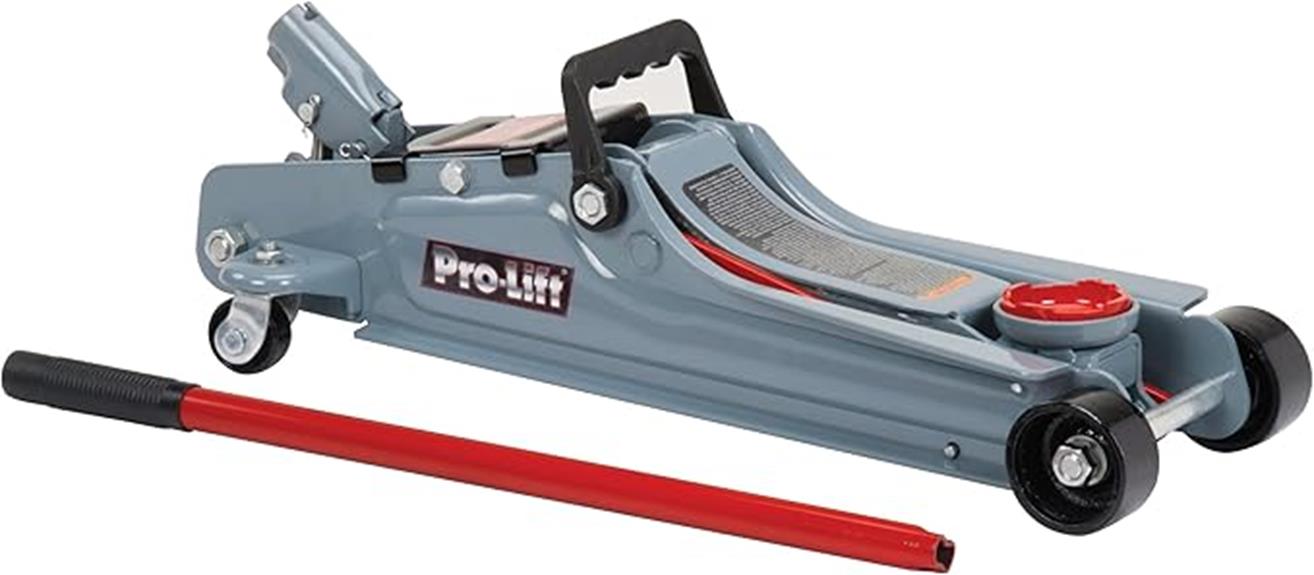
If you're looking for a reliable floor jack that can easily lift low ground clearance vehicles, the Pro-Lift F-767 Grey Low Profile Floor Jack is an excellent choice. With a lifting range from 3-3/8 inches to 14 inches, it handles my low-profile car effortlessly. Weighing just 30 pounds, its compact design makes it easy to store and transport. The heavy-duty steel construction guarantees it's durable, while the patented bypass device prevents over-pumping, adding to its safety features. I appreciate the built-in safety valve, which provides overload protection. Although some users report hydraulic fluid leakage, my experience has been positive. Overall, with an average rating of 4.3 stars, I find it to be a dependable option for lifting vehicles safely and efficiently.
Best For: Those seeking a reliable and easy-to-use floor jack for low ground clearance vehicles.
Pros:
- Heavy-duty steel construction ensures long-lasting durability.
- Compact and low-profile design allows for easy access under low vehicles.
- Patented bypass device prevents over-pumping, enhancing user safety.
Cons:
- Some users report hydraulic fluid leakage issues.
- Limited lifting height may not accommodate all vehicle models.
- Caution is advised when purchasing used items due to potential defects.
VEVOR 3 Ton Low Profile Racing Floor Jack
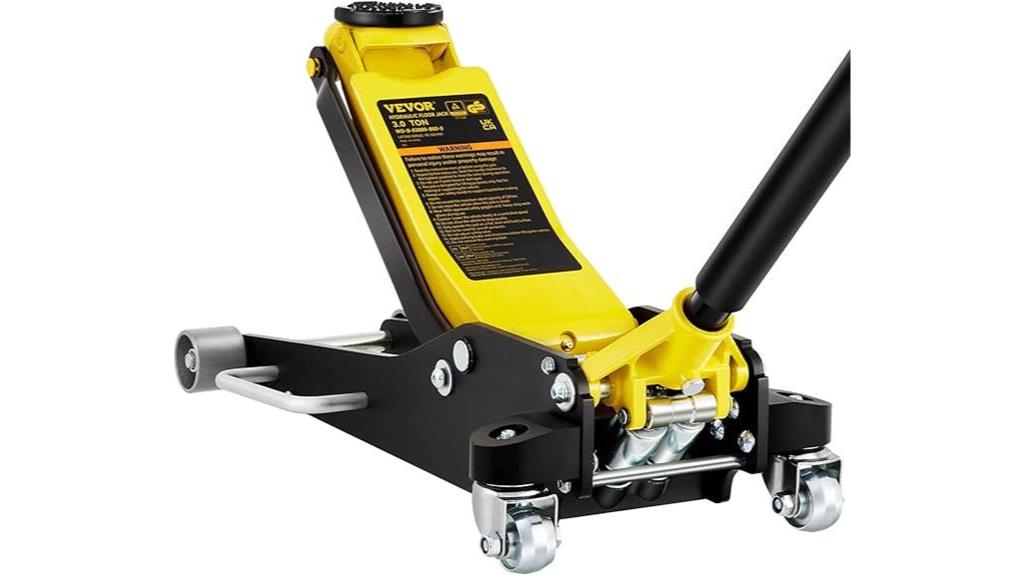
The VEVOR 3 Ton Low Profile Racing Floor Jack is ideal for car enthusiasts and professionals seeking a reliable tool for quick and efficient lifting. With a load capacity of 3 tons, it handles up to 6,600 pounds with ease. I appreciate its lifting range, starting from just 3.5 inches up to 19.7 inches, making it perfect for low-profile vehicles. The dual pistons quick lift pump allows me to get my car off the ground in just seven strokes. Plus, the 360-degree rotatable saddle and four wheels enhance maneuverability. I feel assured using this jack, as it complies with multiple safety certifications. Just keep in mind that some users reported difficulties with the hydraulic system access, so check the instructions carefully.
Best For: Car enthusiasts and professionals looking for a reliable and efficient floor jack for low-profile vehicles.
Pros:
- High load capacity of 3 tons (6,600 lbs) for handling heavy vehicles.
- Quick lifting capability with a dual pistons pump requiring only seven strokes.
- Enhanced maneuverability with four wheels and a 360-degree rotatable saddle.
Cons:
- Some users reported difficulties accessing the hydraulic system.
- Instructions may be unclear, leading to potential confusion during use.
- Mixed experiences noted regarding customer support responsiveness.
2 Ton Heavy Duty Steel Floor Jack
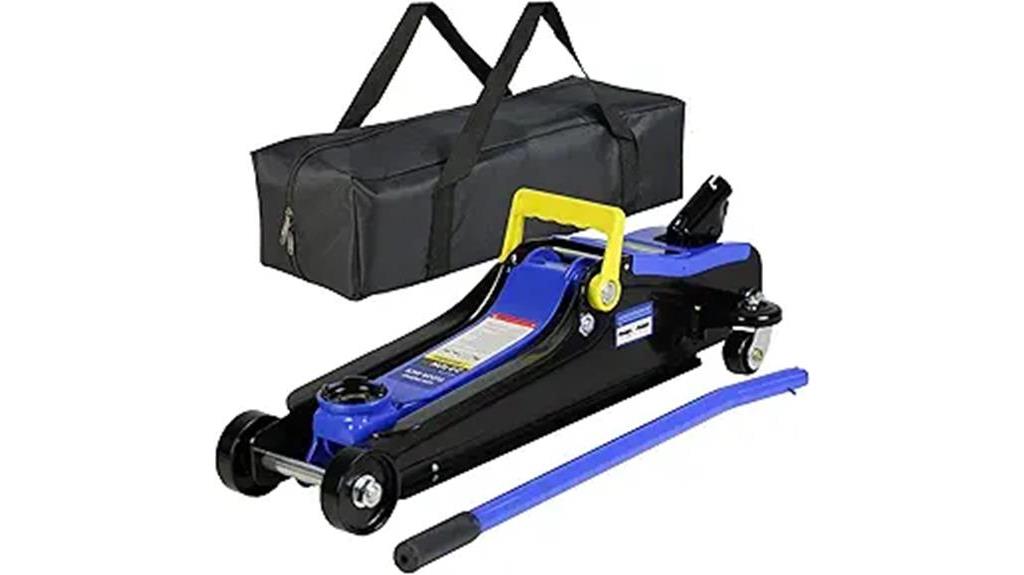
For anyone needing a reliable solution for lifting vehicles, the 2 Ton Heavy Duty Steel Floor Jack stands out with its impressive lifting range of 3.3 to 15.2 inches, perfect for family cars, trucks, and SUVs. Weighing only 29.1 pounds, it's surprisingly portable, making it easy to maneuver around the garage or take on the road. The 360-degree rotating rubber saddle protects your vehicle while providing stability during lifting. Plus, it features built-in overload protection for added safety. I appreciate the extended handle that reduces strain, and the compact design makes storage effortless. With a solid rating of 4.5 stars from users, this jack has proven its worth for tire changes and maintenance tasks alike.
Best For: Those seeking a reliable, portable jack for occasional automotive maintenance tasks like tire changes and oil changes.
Pros:
- Durable construction ensures stability and safety during lifting.
- Lightweight design makes it easy to transport and maneuver.
- 360-degree rotating rubber saddle protects vehicles while lifting.
Cons:
- Limited lifting range may not accommodate larger vehicles.
- Weight capacity may not be sufficient for heavier duty tasks.
- Requires proper jack stands for enhanced safety during use.
Dual Pistons Low Profile Car Jack (3 Ton Capacity)
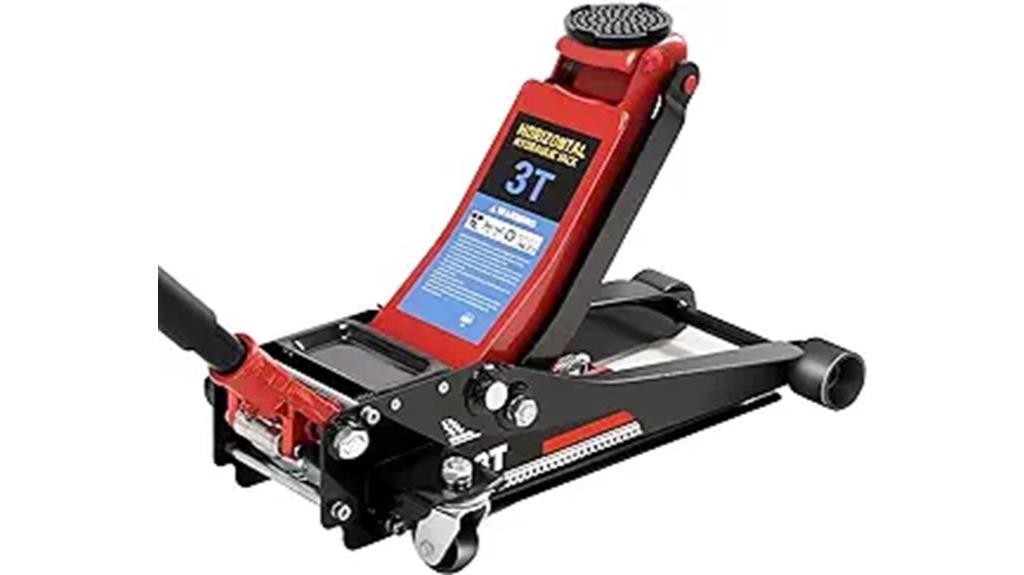
Engineered for car enthusiasts and DIY mechanics, the Dual Pistons Low Profile Car Jack boasts a remarkable lifting range starting as low as 2.95 inches. With a 3-ton capacity, it's perfect for cars, small SUVs, and light trucks. The dual piston pump allows for rapid lifting, making it five times faster than single pump jacks, which I really appreciate when I'm in a hurry. Its robust, heavy-duty steel hybrid construction guarantees durability and stability, a must for safety during use. Plus, the safety overload system prevents any mishaps beyond its load limit. While some users mention the release bolt can be tricky, the overall performance and ease of assembly have earned it a solid 4.4-star rating.
Best For: Car enthusiasts and DIY mechanics looking for a reliable and efficient lifting solution for cars, small SUVs, and light trucks.
Pros:
- Rapid lifting: Dual piston pump allows for lifting five times faster than single pump jacks.
- Durable construction: Heavy-duty steel hybrid build ensures stability and longevity.
- Safety features: Includes a safety overload system and meets ASME safety standards.
Cons:
- Release bolt difficulty: Some users find the release bolt tricky to adjust.
- Weight: At 62.9 pounds, it may be cumbersome for some users to maneuver.
- Limited color options: Available only in red, which may not suit everyone's preference.
Floor Jack Kit 2 Ton with Case
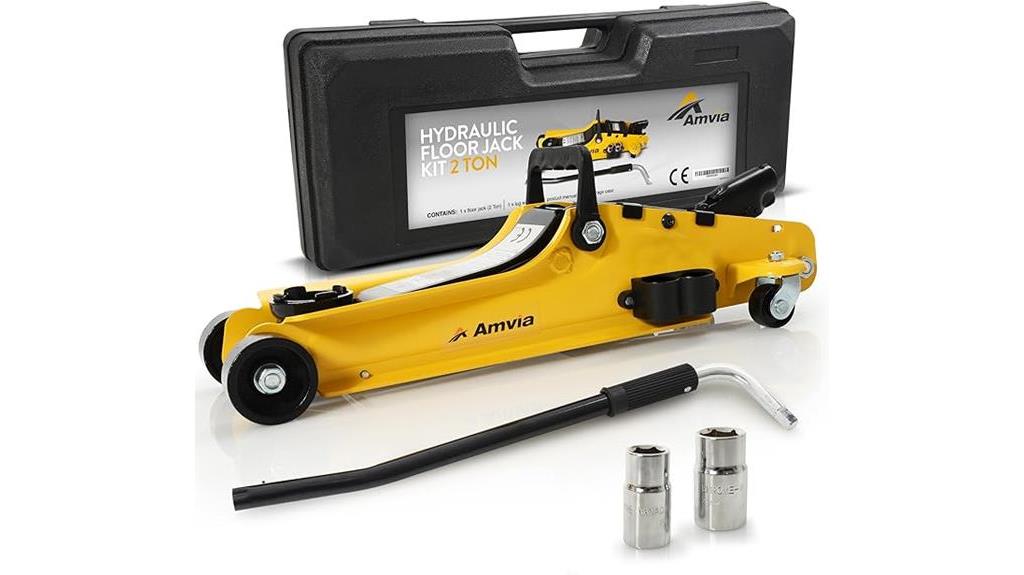
Looking for a reliable solution to lift your low-clearance vehicle? The Floor Jack Kit 2 Ton with Case is an excellent choice. With a maximum lifting weight of 2 tons and an adjustable height range of 3.34 to 15.15 inches, it fits perfectly under most sedans, SUVs, and crossovers. Weighing just 33 lbs and featuring a compact design, it's easy to maneuver in tight spaces. I appreciate the included lug wrench and double-ended sockets, which add convenience during tire changes. Plus, the durable heavy gauge steel construction guarantees stability and safety while lifting. With a satisfaction guarantee and a 4.7-star rating, this kit is a dependable option for any automotive enthusiast.
Best For: Automotive enthusiasts seeking a compact and reliable floor jack for low-clearance vehicles.
Pros:
- Compact and lightweight design allows for easy maneuverability in tight spaces.
- Durable construction from heavy gauge steel ensures stability and safety during use.
- Includes essential accessories like a lug wrench and double-ended sockets for added convenience.
Cons:
- Limited lifting height range may not accommodate all vehicle types.
- May require additional jack pads for sensitive vehicles to prevent damage.
- Relatively low weight capacity compared to heavier-duty jacks, which may limit use for larger vehicles.
Factors to Consider When Choosing a Low Profile Car Jack
When choosing a low profile car jack, you've got to think about several key factors. First, consider the load capacity and lifting range to guarantee it meets your needs. Don't overlook safety features, design, portability, and build quality, as these elements can greatly impact your experience.
Load Capacity Requirements
Choosing the right load capacity is essential for guaranteeing your low profile car jack safely lifts your vehicle. Most models have a load capacity ranging from 2 tons (4,000 lbs) to 3 tons (6,000 lbs). If you drive a sedan or coupe, a 2-ton capacity is often sufficient. However, for heavier vehicles like SUVs or light trucks, you'll need a 3-ton capacity to guarantee safe lifting.
Always check the manufacturer's specifications for the maximum lifting weight. Overloading the jack can lead to mechanical failure, posing significant safety hazards. Remember that the load capacity should not only meet but exceed your vehicle's weight, especially if you'll be carrying additional loads during maintenance tasks.
For instance, if you're lifting a vehicle that weighs 3,500 lbs, a 2-ton jack will work, but it's wise to choose a jack with a higher capacity to account for any added weight. Prioritizing the correct load capacity not only enhances safety but also guarantees your jack performs reliably over time. By choosing a jack that suits your vehicle's requirements, you can work with confidence and peace of mind.
Lifting Range Specifications
Understanding the lifting range specifications of a low profile car jack is essential for ensuring it meets your vehicle's needs. The lifting range typically spans from as low as 2.95 inches to as high as 19.69 inches, allowing you to access a variety of vehicles, including sedans, SUVs, and light trucks. If you own a vehicle with limited ground clearance, look for jacks with a minimum height around 3 inches to 3.34 inches.
On the other hand, if you work on taller vehicles, it's vital to choose a jack that can reach maximum heights of 18.3 inches or more. This versatility is key for performing maintenance tasks without hassle.
When selecting a low profile car jack, don't forget to take into account the load capacity alongside the lifting range. Most low profile jacks can support between 2 to 3 tons, ensuring safe lifting of the vehicles you plan to work on. By keeping these factors in mind, you can choose the right low profile car jack that not only fits your vehicle's specifications but also enhances your overall lifting experience.
Safety Features Importance
Safety features play a significant role in the effectiveness and reliability of a low profile car jack. When you're lifting a vehicle, you want to guarantee you're protected from potential accidents. Built-in overload protection is necessary; it prevents the jack from exceeding its load capacity, reducing the risk of equipment failure. A safety release valve is another key feature, allowing you to control how quickly the vehicle lowers. This prevents sudden drops that could cause injury.
Additionally, look for jacks that comply with safety standards, like ASME. Compliance indicates the jack has undergone thorough testing and meets important safety requirements. Features such as a safety overload system are essential for preventing use beyond the load limit, which is critical for your safety during operations.
Design and Portability
When you're in the market for a low profile car jack, design and portability are essential factors to take into consideration. These jacks typically have a minimum height ranging from 2.95 to 3.3 inches, allowing you to easily fit them under vehicles with low ground clearance. You'll want to evaluate the weight of the jack, which can vary from approximately 30 to 64 pounds. Lighter models can be easier to maneuver in tight spaces.
A compact design enhances the jack's maneuverability, making it suitable for both garage use and on-the-go applications. Look for models crafted from heavy-duty steel or a hybrid of steel and aluminum, as these materials provide durability while keeping the overall weight manageable. Some jacks even feature extended handles that reduce strain during operation and allow for compact storage when not in use.
Ultimately, a well-designed and portable low profile car jack will make your lifting tasks safer and more efficient, whether you're working in your garage or tackling roadside emergencies. So, take these factors into consideration to find the right fit for your needs.
Build Quality Considerations
Choosing the right low profile car jack hinges on its build quality, which can greatly affect your lifting experience. First, look for heavy-duty steel construction, as this guarantees long-term durability and stability during your lifting operations. While lighter models may be more portable, heavier units often provide better support and stability.
Next, check for features like a robust sealing system that enhances security and prevents hydraulic fluid leakage. This is vital for safe operation, especially during prolonged use. Safety mechanisms should also be a priority; confirm the jack includes overload protection and safety release valves to protect you from accidents.
Lastly, evaluate the design for a low profile that allows access under low-clearance vehicles. This feature is fundamental for effective performance in various automotive tasks, such as oil changes or tire replacements. By focusing on these build quality considerations, you'll not only improve your lifting experience but also enhance your overall safety while working under your vehicle. Investing in a well-built low profile car jack will pay off in reliability, functionality, and peace of mind.
Frequently Asked Questions
How Much Weight Can a Low Profile Jack Safely Lift?
A low profile jack typically lifts between 2 to 3 tons, but you should always check the manufacturer's specifications for the exact weight limit. It's essential to verify your jack can handle the weight of your vehicle for safe lifting. When using it, make sure you're on a stable surface and follow all safety precautions. Remember, lifting more than the jack's capacity can lead to serious accidents or equipment failure, so stay safe!
Are Low Profile Jacks Suitable for SUVS or Trucks?
When it comes to low profile jacks, you might be biting off more than you can chew if you're trying to lift an SUV or truck. These jacks are generally designed for lower vehicles, so they may struggle with the height and weight of larger vehicles. If you've got an SUV or truck, it's better to stick with a jack specifically made for those heavier and taller builds to guarantee safety.
What Are the Maintenance Tips for a Low Profile Jack?
To keep your low profile jack in top shape, regularly inspect it for any signs of wear or damage. Make certain to clean it after each use, removing dirt and debris. Lubricate the moving parts to guarantee smooth operation and check the hydraulic fluid levels, topping off if necessary. Store it in a dry place to prevent rust. Following these tips will help extend your jack's lifespan and maintain its safety.
Can I Use a Low Profile Jack on Uneven Surfaces?
You shouldn't use a low profile jack on uneven surfaces. It can compromise stability and lead to accidents. If the ground isn't level, your jack might tip or slide, risking damage to your vehicle and injury to yourself. Always look for a flat, solid surface before lifting. If you're in a pinch, consider using wheel chocks or leveling blocks to create a more stable base before attempting to lift your car safely.
How Do I Know When a Jack Needs Replacing?
You'll know it's time to replace your jack when you notice leaks, strange noises, or difficulty lifting your vehicle. If the jack wobbles or doesn't hold its position while lifting, that's a clear sign of wear. Check the weight rating too; if you're consistently near or over it, your jack might be struggling. Always prioritize safety—if you have doubts about its reliability, it's best to invest in a new one.
Wrapping Up
In choosing the right low profile car jack, you want safety, efficiency, and durability. Whether you opt for the Pro-Lift F-767 for its reliability, the VEVOR for its power, or the compact Floor Jack Kit for convenience, each option offers unique benefits. Prioritize your needs, consider your vehicle's clearance, and invest wisely. With the right jack, you'll lift with confidence, work with ease, and enjoy peace of mind knowing you're well-equipped for the task ahead.
Ben Wilkinson is a an experienced mechanic with over 10 years of experience in the automotive repair industry. He is highly skilled in diagnosing and repairing a wide range of car-related issues, from basic maintenance tasks to more complex repairs.

